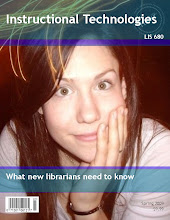It's back. The awareness that contributions are public, and therefore potentially exposing, and therefore intimidating.
Wait, wait, wait, I tell myself. Aren't people all too eager to twitter every second? Surely, people have something—a billion things—to say, and no qualms about saying it publicly. BUT. There is tremendous range as far as the type of contribution that's possible. Twittering (tweeting?) about what you're doing and how you're feeling about, say, yourself, is easy; there’s no wrong answer, you speak from as little or as much expertise as you like, and something about the personal element makes it your soapbox.
But the note at the close of The New Yorker’s "Know It All: Can Wikipedia conquer Expertise?" article by Stacy Schiff (http://www.newyorker.com/archive/2006/07/31/060731fa_fact), suggests that anonymity is not an uncommon component of the wiki world for a reason:
“Essjay was recommended to Ms. Schiff as a source by a member of Wikipedia’s management team because of his respected position within the Wikipedia community. He was willing to describe his work as a Wikipedia administrator but would not identify himself other than by confirming the biographical details that appeared on his user page. At the time of publication, neither we nor Wikipedia knew Essjay’s real name. Essjay’s entire Wikipedia life was conducted with only a user name; anonymity is common for Wikipedia administrators and contributors, and he says that he feared personal retribution from those he had ruled against online.”
Before one posts on a professional wiki, it would behoove one to be well informed about not only the purpose of the wiki, but also about the topic on which one is posting. Even an opinion should be well formed and supported, it seems. I suppose I’d define it as audience-conscious blogging, the idea being that one shouldn’t only have the potential judgments of the likely audience of the post in mind, but also their needs. How useful is what you have to say to others?
As a number of our readings have pointed out, participation is the key element to a tool's success. Forced wikiing I’d argue, begets poor wikiing, if only because it does not spring organically from an authentic need.
I was fascinated to review the profile of wikiier “elm007,” a central figure in NYC’s Office of School Library Services. She did include a picture, which is a voluntary piece of information. Also available for public viewing, though, were these stats:
Member since Dec 19, 2006 5:49 am
111 page edits, 3 message posts
Wikispaces: 08schoollibraryfallconference, 8-Million-Reasons-to-Read, IFC-Integration, Library-Automation, newlyassigned, nyc-ccd, nyc-inquiry, NYCSLS-Assessments, NYCSLS-Council, NYCSLS-ReadingToolkit, schoollibraryfallconference07, slsmentor, tween2teen
That’s a lot of info! I will have to investigate further into how many of those stats are voluntary. This recalls our discussion about the control settings of SNS, and how their defaults are often set to public.
All this said, I’ve seen wikis that work, and I’ve been inspired by them. Our class wiki has been an extremely useful tool, for example. Also, the wiki created by the New York City School Library System’s Program of Cooperative Collection Development (CCD), which is funded by the New York State Education Department and which, “promotes resource sharing opportunities among member libraries,” is excellent:
It is introduced this way: “In order to support the CCD program’s mandate for resource sharing, the librarians who curate the individual collections have created pathfinders. They have been posted on a Wiki: http://nyc-ccd.wikispaces.com. They are listed on the left hand column in the table of contents. Please access these for guidance and suggested resources when your students or faculty need materials within these subject areas” (http://schools.nyc.gov/Academics/LibraryServices/EducatorResources/EducationalResources/Cooperative+Collection+Development).
Another wiki I've invited into my life, if only in hopes of them wooing me into participation*:
Library Automation Wiki: http://library-automation.wikispaces.com/Cataloging+Tools
Another fun one (because of all the pictures?): http://robinhoodlibrarians.wikispaces.com/
* This sounds snotty, I know, but I promise I'm open to them; I just haven't encountered a need for the tool yet, so it's more of tool to explore, at this point, than a need-to-use to accomplish x goal.
Sunday, March 29, 2009
Subscribe to:
Post Comments (Atom)

No comments:
Post a Comment